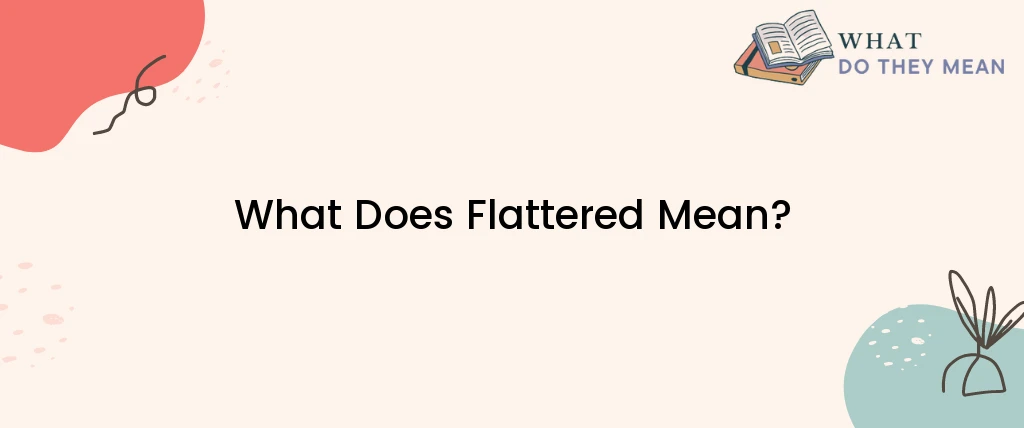The word “flattered” is derived from the Middle English word “flater,” which means to stroke or caress. This word can be traced back to the Old French word “flater,” which was used to describe the act of making someone feel good or pleased. Over time, the meaning of the word evolved to encompass the idea of feeling pleased or gratified by compliments or praise.
In the 16th and 17th centuries, the word “flattered” was frequently used in literature to describe characters who were vain and overly pleased with themselves. However, by the 18th and 19th centuries, the word had become more commonly used in a positive context to describe someone who was gratified by praise or compliments.
Today, the word “flattered” continues to be widely used in a variety of contexts and remains an important part of our everyday vocabulary. Whether used in a social, professional, or everyday context, understanding the meaning and usage of this word is an essential aspect of effective communication.
Literal and Figurative Meanings of “Flattered”:
The word “flattered” has both literal and figurative meanings, which are important to understand in order to use the word correctly.
The literal definition of “flattered” is to stroke or caress, typically in a physical sense. For example, if someone were to physically stroke or caress another person’s hair, they might be described as “flattering” that person.
However, the word is most commonly used in a figurative sense, which refers to the feeling of pleasure or satisfaction that is produced by compliments, praise, or favorable attention. For example, if someone were to tell you that you did a great job on a presentation, you might feel “flattered” by their praise. In this context, the word “flattered” is used to describe the positive feelings that are produced by the compliments or praise.
It is important to understand both the literal and figurative meanings of “flattered” in order to use the word correctly in different contexts. By understanding the different meanings of this word, you will be able to effectively communicate and express your feelings in a variety of situations.
Different Connotations of “Flattered”:
The word “flattered” can carry different connotations depending on the context in which it is used.
One of the most common connotations of “flattered” is a positive one, in which the word is used to describe feelings of pleasure, satisfaction, or gratification that result from compliments, praise, or favorable attention. For example, if someone compliments your outfit, you might feel “flattered” by their praise.
However, “flattered” can also have a negative connotation in some contexts. For example, if someone is overly pleased with themselves or their own abilities, they might be described as “flattered.” In this context, the word is often used to suggest that someone is being too confident or boastful.
Finally, “flattered” can also have a neutral connotation, in which the word is used simply to describe a feeling of pleasure or satisfaction, without any positive or negative connotations. For example, if someone is offered a job that they are pleased with, they might say they are “flattered” to have been offered the position.
How “Flattered” is Used in Different Contexts:
The word “flattered” is used in a variety of contexts, and its meaning can vary depending on the situation. Here are a few examples of how “flattered” can be used in different contexts:
- Social Contexts: In social situations, “flattered” is often used to describe the feeling of pleasure or satisfaction that results from compliments, praise, or favorable attention. For example, if someone compliments your cooking skills, you might feel “flattered” by their praise.
- Professional Contexts: In a professional setting, “flattered” is often used to describe feelings of satisfaction or gratification that result from being offered a job, a promotion, or a special recognition. For example, if you are offered a job that you are pleased with, you might say you are “flattered” to have been offered the position.
- Romantic Contexts: In romantic situations, “flattered” is often used to describe the feeling of pleasure or satisfaction that results from compliments or attention from a potential romantic partner. For example, if someone compliments your appearance, you might feel “flattered” by their praise.
- Everyday Contexts: In everyday situations, “flattered” is often used to describe the feeling of pleasure or satisfaction that results from compliments, praise, or attention from friends, family members, or acquaintances. For example, if someone compliments your sense of humor, you might feel “flattered” by their praise.

As a researcher, I am curious and driven by the pursuit of knowledge. I approach my work with a critical eye, carefully evaluating sources and methods to ensure that my findings are accurate and reliable. Whether delving into scientific studies, historical records, or cutting-edge technologies, I am always seeking to expand my understanding and make new discoveries. I am dedicated to uncovering new insights and finding solutions to complex problems, and am driven by a passion for uncovering the truth.

